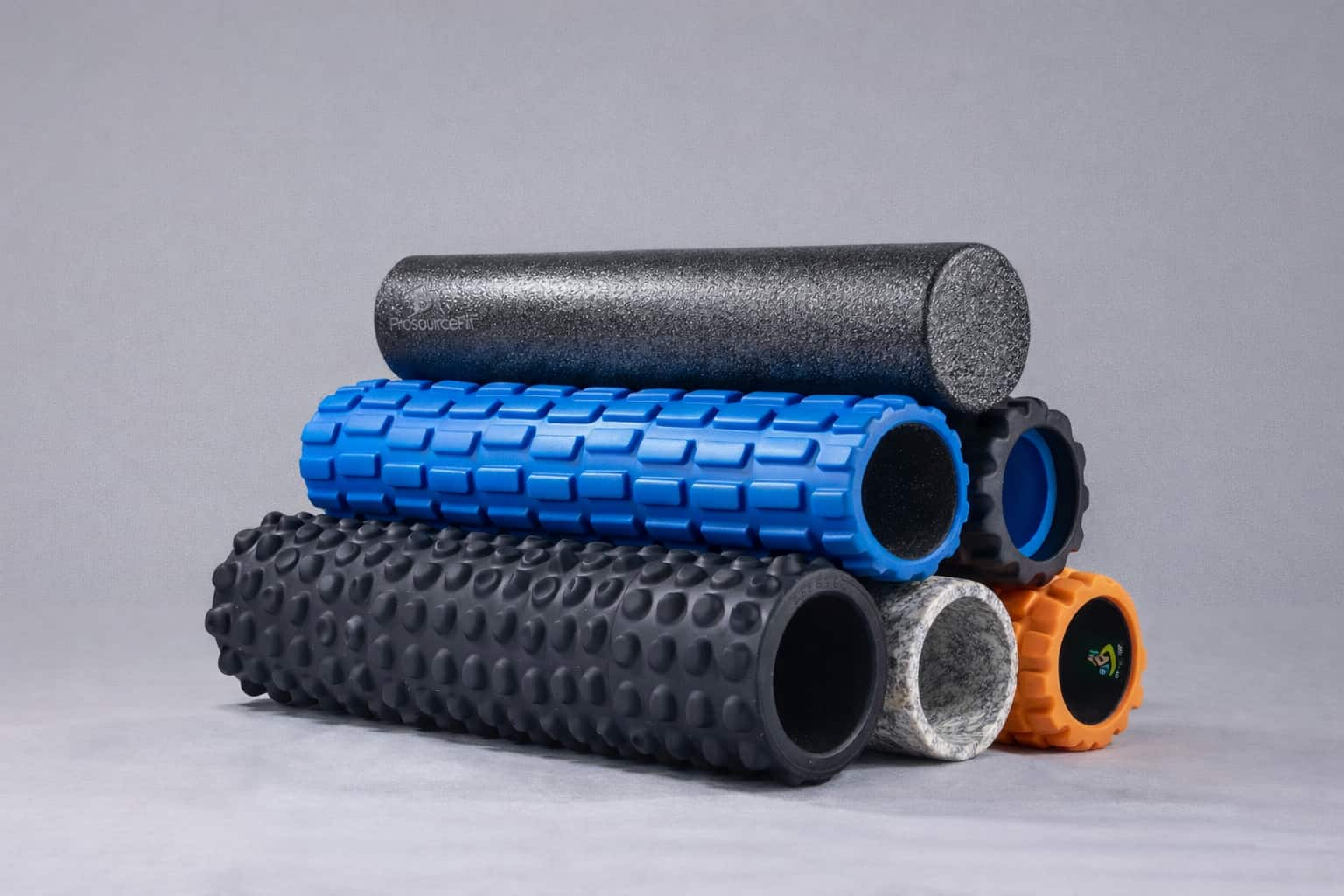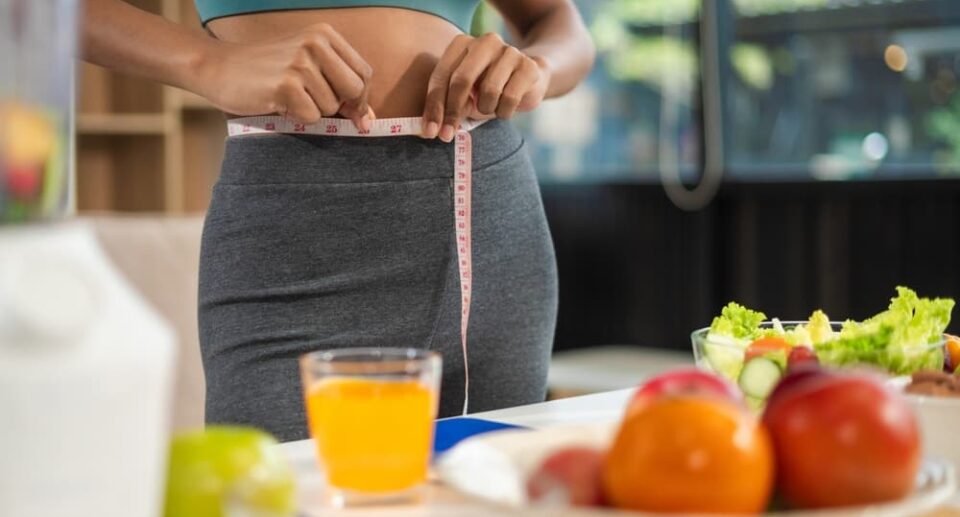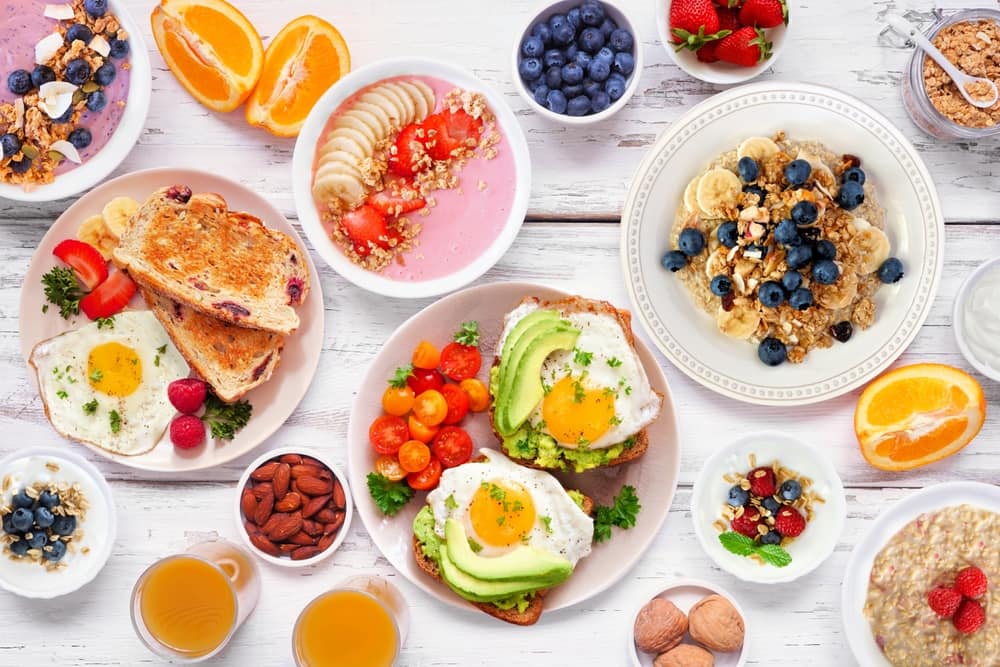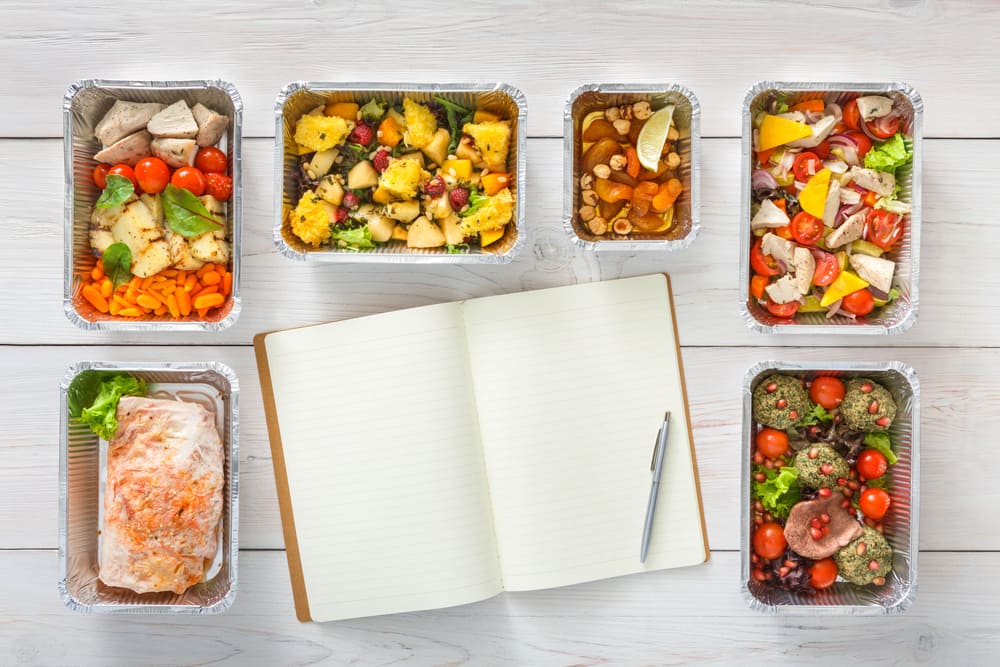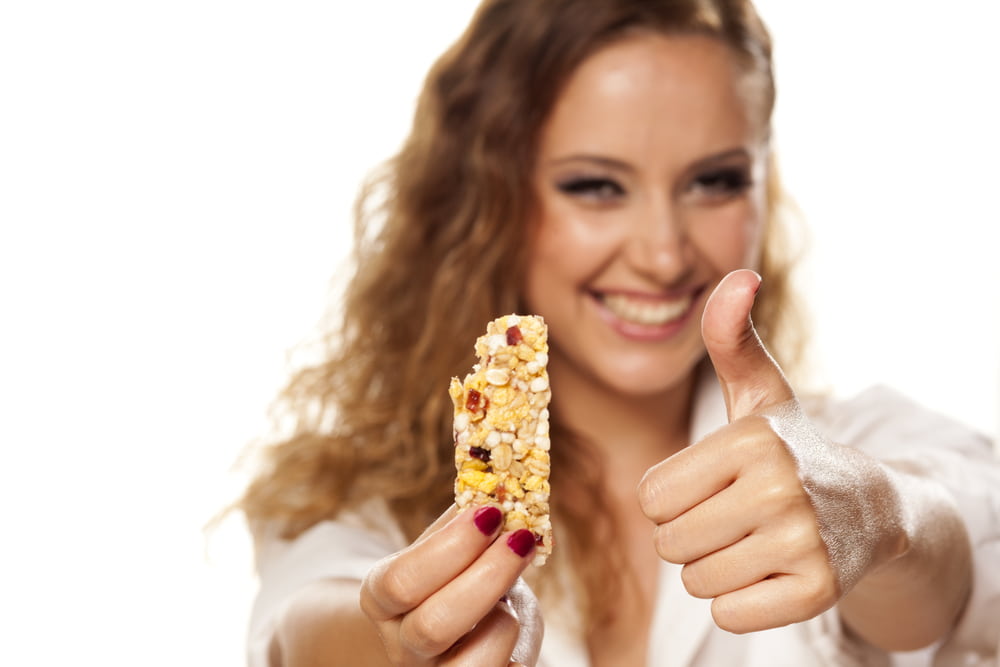10 Best Vegan Foods for a Clean Energy Boost
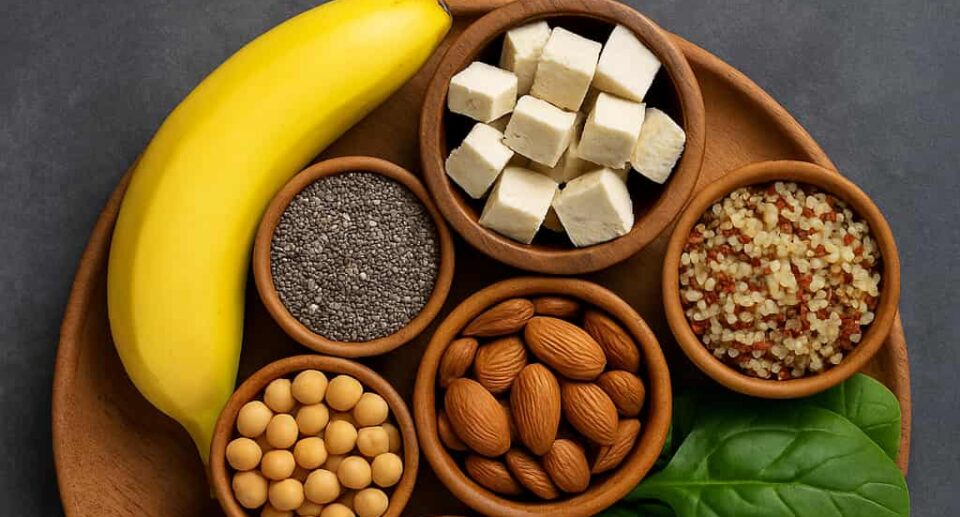

How a Vegan Diet Improves Your Energy Levels
A vegan diet can significantly improve your energy levels by promoting clean eating and supporting your body with nutrient-dense, plant-based foods. Unlike high-fat or heavily processed diets that often lead to fatigue and sluggishness, a plant-based lifestyle focuses on whole foods that fuel your cells efficiently. These foods are naturally lower in saturated fat and higher in fiber, antioxidants, and essential micronutrients that keep your energy steady throughout the day.
One of the main reasons people on a vegan diet often feel more energetic is the way plant-based nutrition enhances cellular energy production. Complex carbohydrates from foods like oatmeal, quinoa, and bananas serve as a steady source of glucose the body’s preferred fuel for generating ATP (adenosine triphosphate), which powers every cell. When your meals are rich in whole grains, fruits, and vegetables, your body receives a slow and sustained release of energy rather than the quick spikes and crashes that come from refined sugar or processed snacks.
Protein also plays a vital role in maintaining stamina. Vegan protein sources such as lentils, tofu, chickpeas, and nuts supply amino acids that repair muscle tissue and support metabolic processes without the heavy digestion load that animal fats often cause. This makes the body more efficient at converting nutrients into usable energy. Micronutrients like magnesium, iron, and B vitamins found in leafy greens, beans, and seeds further help in oxygen transport and energy metabolism key factors in preventing fatigue. High-fat or processed diets may offer temporary satisfaction but often lead to energy crashes because of their impact on insulin response and digestion. The fiber and phytonutrients in vegan foods help stabilize blood sugar and reduce inflammation, allowing for consistent performance throughout the day. For instance, a breakfast of oatmeal topped with banana and nuts can provide long-lasting energy, while a lunch rich in quinoa, spinach, and lentils helps sustain focus and vitality.
Research from institutions like Harvard Health and Medical News Today supports these benefits, showing that plant-based diets improve mitochondrial function and cardiovascular efficiency, both of which directly influence energy levels. In short, when you fuel your body with plant-based nutrition, you’re not just eating cleaner you’re powering your body more intelligently for lasting, vibrant energy.
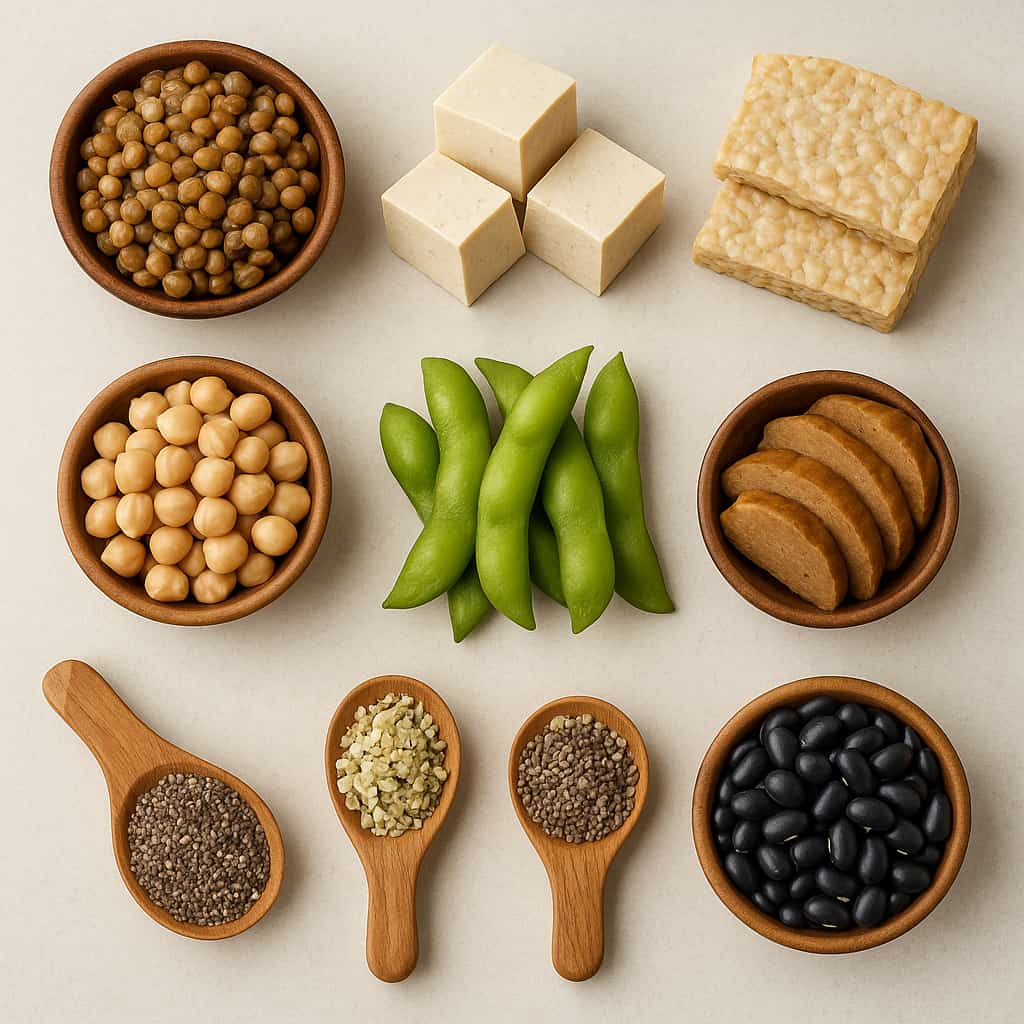

Top 10 Best Vegan Foods for a Clean Energy Boost
Getting enough protein on a vegan diet is easier than most people think. With a variety of plant-based protein sources available, you can easily meet your daily protein needs without relying on animal products. Foods like lentils, tofu, tempeh, quinoa, and chickpeas are not only packed with protein but also rich in fiber, vitamins, and minerals that contribute to overall wellness and muscle recovery.
Here are some of the best vegan protein sources to include in your meals:
Lentils – About 18 grams of protein per cooked cup. Lentil protein is rich in iron and supports steady energy for active individuals.
Tofu – Roughly 20 grams per cup. The benefits of tofu extend beyond protein it also contains calcium and iron, making it ideal for vegan bodybuilding foods.
Tempeh – Around 30 grams per cup. This fermented soy product offers probiotics for gut health along with a complete amino acid profile.
Chickpeas (Garbanzo Beans) – About 15 grams per cup. They’re versatile, delicious in salads or curries, and an excellent source of complex carbs and fiber.
Quinoa – Approximately 8 grams per cup. It’s one of the few plant-based protein sources that’s considered a complete protein, containing all nine essential amino acids.
Edamame – About 17 grams per cup. High in protein and antioxidants, edamame is great as a snack or side dish.
Seitan – Nearly 25 grams per 3.5 ounces. Made from wheat gluten, it’s a favorite among athletes for its dense protein content.
Peas – Around 9 grams per cup. Pea protein is often used in plant-based protein powders for muscle building and recovery.
Chia Seeds – 5 grams per two tablespoons. They provide omega-3 fatty acids and help with muscle repair and hydration.
Hemp Seeds – 10 grams per three tablespoons. These are rich in magnesium, iron, and all essential amino acids.
Black Beans – 15 grams per cup. Great for maintaining blood sugar balance while adding valuable protein to your diet.
Understanding the amino acid profile is key to maximizing plant-based nutrition. Most plant proteins are “incomplete,” meaning they lack one or more essential amino acids. However, by combining foods like rice and beans, hummus and whole-grain pita, or peanut butter and oats, you can easily create complete protein meals that provide all essential amino acids needed for muscle repair and energy production.
For vegan athletes and gym-goers, focus on consuming about 1.2 to 2.0 grams of protein per kilogram of body weight daily, depending on your training intensity. Distribute protein intake evenly throughout the day include sources like tofu stir-fry for lunch, a quinoa bowl for dinner, and a lentil smoothie or protein shake after workouts. Using plant-based protein powders made from pea, hemp, or brown rice can also help bridge any nutritional gaps.
Incorporating these vegan protein sources ensures that your body receives the essential nutrients for building lean muscle, supporting recovery, and sustaining energy. A balanced, plant-based protein strategy can power your fitness goals just as effectively if not more than traditional animal-based diets.
Vegan Foods That Enhance Focus and Brain Power
A well-balanced vegan diet doesn’t just fuel your body it also powers your brain. The right plant-based foods provide essential nutrients that improve concentration, memory, and mental clarity. Unlike processed foods that cause sudden spikes and drops in blood sugar, a whole-food vegan diet promotes consistent energy to keep your mind sharp and focused throughout the day.
One of the most important nutrients for brain health is omega-3 fatty acids. While most people associate omega-3s with fish, there are excellent vegan omega-3 sources such as chia seeds, flaxseeds, and walnuts. These foods contain alpha-linolenic acid (ALA), which the body can partially convert into DHA and EPA fatty acids that support brain cell structure and communication. Regular intake of these plant-based omega-3 sources helps improve focus, reduce inflammation, and support long-term cognitive health.
Vitamin E is another key nutrient found abundantly in nuts, seeds, and avocado. It acts as a powerful antioxidant that protects brain cells from oxidative stress, one of the major contributors to cognitive decline. Antioxidant-rich foods like blueberries, blackberries, and dark cacao also help neutralize free radicals, improving both memory and reaction time. Green leafy vegetables such as spinach, kale, and collard greens supply folate, iron, and magnesium minerals vital for neurotransmitter function and oxygen delivery to the brain.
Maintaining stable blood sugar is essential for sustained focus. A plant-based diet high in fiber and complex carbohydrates such as oats, quinoa, and sweet potatoes prevents energy crashes that often cause brain fog. Instead of relying on caffeine or sugar for quick bursts of energy, nutrient dense vegan brain foods provide slow-releasing energy for hours of mental performance and alertness.
Below is a quick reference table highlighting some of the best vegan foods for brain health and the nutrients they provide:
| Food | Key Nutrient | Brain Benefit |
|---|---|---|
| Chia Seeds | Omega-3 (ALA) | Improves focus and memory |
| Flaxseeds | Omega-3, Fiber | Reduces inflammation and supports mental clarity |
| Walnuts | Omega-3, Vitamin E | Protects neurons and enhances cognitive function |
| Blueberries | Antioxidants | Boosts memory and combats oxidative stress |
| Spinach | Iron, Folate | Supports oxygen flow and neurotransmitter balance |
| Avocado | Vitamin E, Healthy Fats | Improves blood flow to the brain |
| Cacao | Antioxidants, Magnesium | Enhances mood and cognitive alertness |
By consistently including these vegan brain foods in your diet, you support not only mental clarity but also long-term brain health. A diet centered around antioxidant foods for energy and omega-3-rich plant sources ensures your mind stays sharp, your focus steady, and your overall mood balanced.
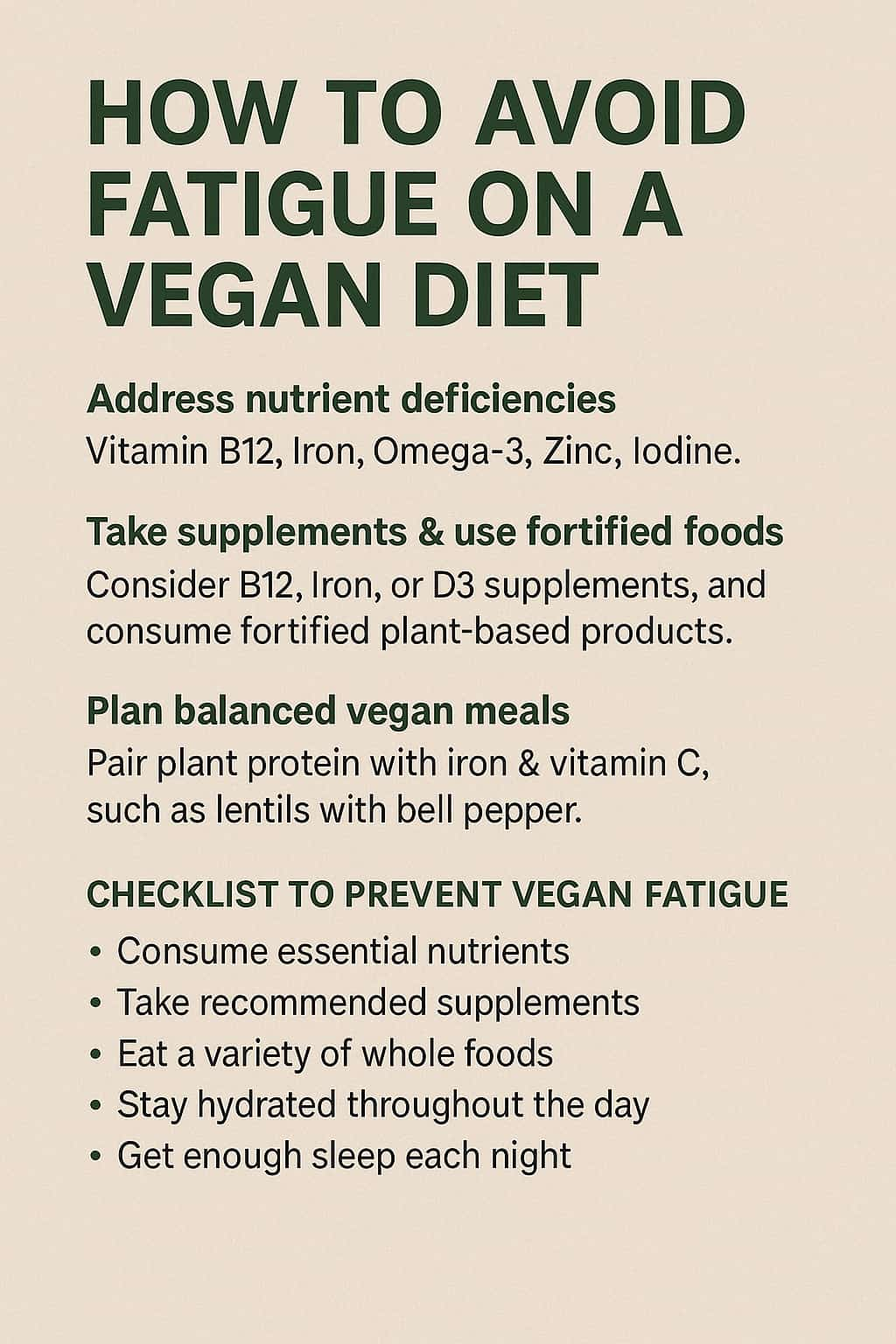

Quick Vegan Snack Ideas for Instant Energy
When you need an energy boost between meals, vegan snacks can be the perfect solution. They’re easy to prepare, full of plant-based protein, fiber, and healthy fats, and they keep your blood sugar stable without processed sugar crashes. Whether you’re heading to work, finishing a workout, or studying late, these quick vegan snack ideas deliver clean, sustained energy while supporting overall wellness.
Here are some simple and nutrient-rich vegan snacks to keep your energy levels up:
Vegan Energy Balls – Made with oats, dates, nut butter, and chia seeds, these bite-sized snacks combine natural sugars and plant-based protein for long-lasting energy and focus.
Nut Butter and Banana Slices – The natural sugars from banana give an instant energy lift, while nut butter provides healthy fats and protein to sustain that energy.
Hummus with Veggies – Chickpeas in hummus are high in protein and fiber, and pairing them with crunchy carrots or cucumber helps maintain steady energy throughout the day.
Green Smoothie – A blend of spinach, banana, and almond milk delivers vitamins, iron, and antioxidants that fight fatigue and enhance alertness.
Chia Pudding – Made with chia seeds soaked in plant-based milk, this snack offers omega-3 fatty acids and fiber that keep you full and energized.
Trail Mix with Nuts and Dried Fruit – Almonds, walnuts, and raisins provide a balanced mix of natural sugars, healthy fats, and protein for a quick energy release.
Avocado Toast on Whole Grain Bread – Rich in complex carbs and heart-healthy fats, it provides a slow, steady energy release to power you through long hours.
To make your snacking routine even easier, here’s a quick reference table:
| Snack | Prep Time | Energy per 100g (Approx.) | Why It Boosts Energy |
|---|---|---|---|
| Vegan Energy Balls | 10 min | 420 kcal | Combines carbs, fats, and protein for sustained energy |
| Nut Butter + Banana | 2 min | 380 kcal | Quick natural sugar with protein balance |
| Hummus with Veggies | 5 min | 250 kcal | High fiber and protein prevent energy dips |
| Green Smoothie | 5 min | 180 kcal | Iron and antioxidants enhance mental alertness |
| Chia Pudding | Overnight | 190 kcal | Omega-3 and fiber maintain steady energy |
| Trail Mix | 1 min | 450 kcal | Healthy fats and natural sugars provide quick fuel |
| Avocado Toast | 5 min | 310 kcal | Complex carbs and fats offer lasting endurance |
These quick vegan snacks fit seamlessly into an active lifestyle and are perfect for anyone seeking clean, plant-based energy without compromising taste or nutrition. By keeping a few of these options ready, you can ensure your body and mind stay energized, focused, and balanced all day long.
Common Myths About Vegan Diet & Energy
Despite the growing popularity of plant-based nutrition, several myths still surround the vegan diet—especially when it comes to energy and performance. Many people assume that vegan food leads to weakness or that it’s impossible to get enough protein without animal products. In reality, a well-planned vegan diet can deliver all the nutrients your body needs for strength, focus, and sustained energy. Let’s break down some of the most common misconceptions.
Myth 1: Vegan food gives less energy
This is one of the biggest misconceptions about plant-based eating. In truth, vegan foods like whole grains, fruits, vegetables, and legumes provide complex carbohydrates—the body’s primary source of clean energy. Unlike processed or high-fat animal foods that can cause sluggishness, plant-based nutrition offers a steady release of glucose for long-lasting vitality. For example, eating oatmeal with nuts and fruit in the morning fuels the body efficiently for hours without energy crashes. Studies published by Harvard Health and the American Journal of Clinical Nutrition also show that plant-based diets improve mitochondrial efficiency, helping the body convert food into energy more effectively.
Myth 2: It’s hard to get enough protein on a vegan diet
Protein deficiency is extremely rare for those who eat a balanced plant-based diet. Vegan protein sources such as lentils, tofu, tempeh, quinoa, edamame, and chickpeas are rich in essential amino acids that support muscle recovery and metabolic function. Combining complementary foods—like rice and beans or hummus and whole grain pita creates complete proteins that meet the body’s needs just as effectively as animal-based options. In fact, many vegan athletes and bodybuilders thrive on plant-based protein because it’s easier to digest and contains no cholesterol.
Myth 3: Vegans need supplements only to stay healthy
While supplements can help fill specific gaps, such as Vitamin B12 or Vitamin D, the foundation of vegan health comes from whole foods. Most nutrients, including iron, calcium, omega-3s, and zinc, can be obtained naturally from a diverse plant-based diet. For instance, chia seeds, walnuts, and flaxseeds are excellent vegan omega-3 sources, while leafy greens and legumes provide iron and calcium. Supplements are a smart safety net, not the primary source of nutrition. A well-balanced vegan diet offers cleaner energy, improved digestion, and better endurance compared to many traditional diets. It supports stable blood sugar, reduces inflammation, and enhances recovery all essential for maintaining both physical and mental performance. Far from being a source of fatigue, a properly structured vegan diet can be one of the most effective ways to energize the body naturally and sustainably.
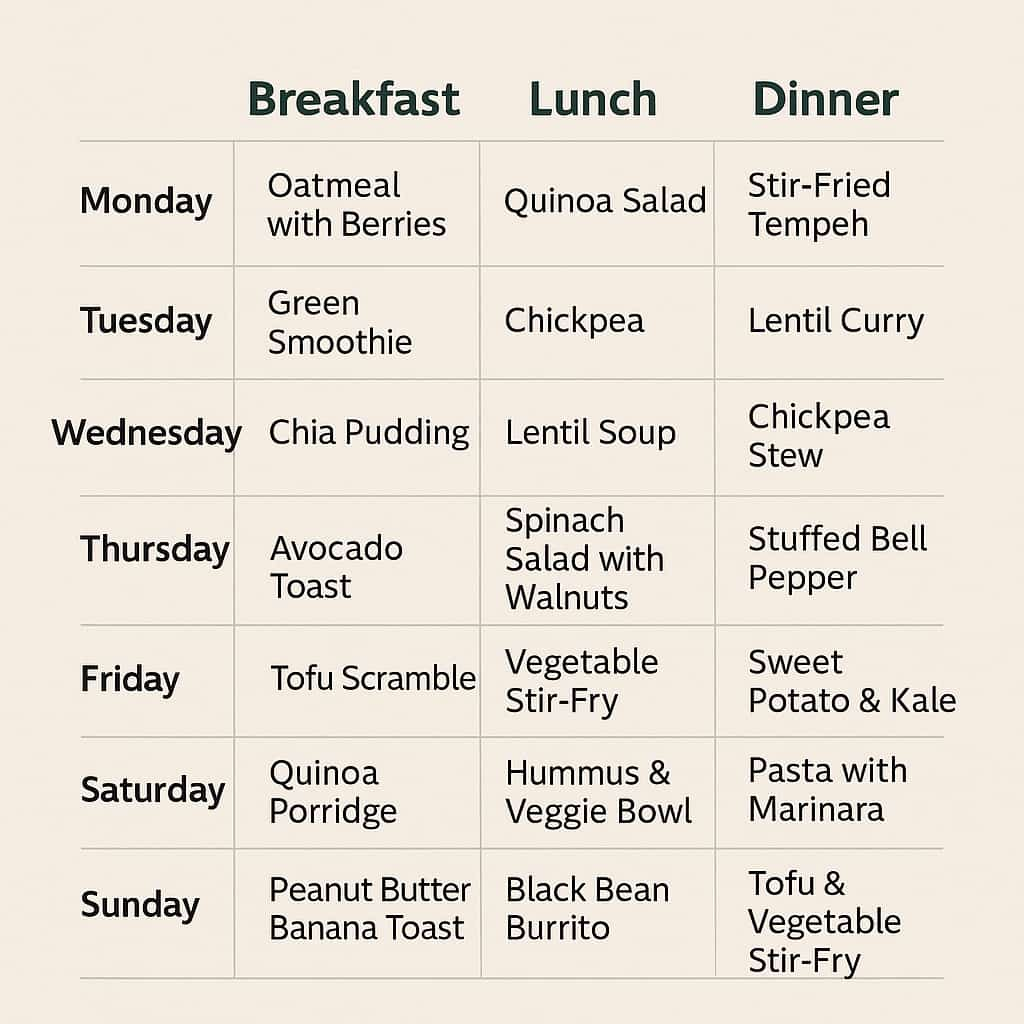

One-Week Vegan Energy Meal Plan
A well-planned vegan meal routine provides all the nutrients your body needs to stay active, focused, and energized throughout the week. This one-week sample meal plan is designed around plant-based protein, complex carbohydrates, healthy fats, and antioxidant-rich foods that maintain blood sugar stability and prevent fatigue. Each meal supports steady energy release and recovery perfect for both busy professionals and fitness enthusiasts.
Day 1
Breakfast: Oatmeal with almond milk, banana slices, chia seeds, and a drizzle of maple syrup
Lunch: Lentil and spinach curry with brown rice
Dinner: Grilled tofu with steamed broccoli, sweet potatoes, and tahini dressing
Day 2
Breakfast: Green smoothie with spinach, apple, flaxseeds, and almond butter
Lunch: Quinoa salad with chickpeas, roasted vegetables, and olive oil
Dinner: Black bean tacos with avocado, lettuce, and tomato salsa
Day 3
Breakfast: Chia pudding made with coconut milk and topped with berries and walnuts
Lunch: Vegan burrito bowl with rice, beans, corn, and guacamole
Dinner: Stir-fried tempeh with mixed vegetables and soba noodles
Day 4
Breakfast: Whole-grain toast with peanut butter and sliced banana
Lunch: Hummus wrap with cucumber, spinach, carrots, and sprouts
Dinner: Lentil soup with quinoa and roasted cauliflower
Day 5
Breakfast: Smoothie bowl with oats, blueberries, hemp seeds, and almond butter
Lunch: Chickpea salad sandwich on whole-grain bread
Dinner: Baked tofu with quinoa, kale, and roasted red pepper sauce
Day 6
Breakfast: Overnight oats with soy milk, chia seeds, and sliced mango
Lunch: Mediterranean bowl with falafel, couscous, and tahini dressing
Dinner: Vegan chili with kidney beans, corn, and bell peppers
Day 7
Breakfast: Avocado toast topped with pumpkin seeds and lemon
Lunch: Vegan sushi rolls with tofu, cucumber, and avocado
Dinner: Stuffed bell peppers with lentils, quinoa, and tomato sauce
Energy-Boosting Tips for the Week
Include at least one omega-3 source (chia, flaxseed, or walnuts) daily.
Combine iron-rich foods (like lentils, spinach) with vitamin C (like peppers, citrus) for better absorption.
Drink 2–3 liters of water each day to maintain hydration.
For extra protein, add pea or hemp protein powder to smoothies.
Keep snacks like trail mix, vegan energy balls, or fruit handy to prevent energy dips.
This one-week vegan energy meal plan balances flavor, nutrition, and performance, ensuring that your body and mind stay strong, alert, and ready for any challenge without the need for animal-based foods.
FAQs About Vegan Diet and Energy
1. Can a vegan diet sustain athletes and active individuals?
Yes. A properly planned vegan diet can fully support athletes and those with active lifestyles. Plant-based protein sources such as lentils, tofu, tempeh, and quinoa provide essential amino acids for muscle growth and recovery. Many professional athletes thrive on vegan nutrition because it reduces inflammation, enhances recovery, and provides steady energy without the heaviness of animal fats.
2. Is coffee vegan?
Yes, coffee itself is naturally vegan. However, what you add to it matters. To keep it vegan-friendly, use plant-based milk alternatives like almond, oat, or soy milk instead of dairy. Avoid creamers that contain animal-derived ingredients, and choose unsweetened or natural sweeteners for cleaner energy.
3. How can I balance my vegan macros for energy and fitness?
Balancing vegan macros is about proportion and variety. Aim for roughly 50–60% of calories from complex carbohydrates (whole grains, fruits, and vegetables), 20–25% from healthy fats (avocado, nuts, seeds, olive oil), and 15–20% from plant-based proteins (tofu, legumes, tempeh). Track your intake with an app or food journal to ensure consistent nutrition that supports your fitness goals.
4. Do vegans get enough Vitamin B12 and Iron naturally?
Vitamin B12 is not naturally present in plant foods, so fortified products or supplements are essential. Iron, however, is abundant in lentils, beans, tofu, and spinach—but it’s best absorbed when paired with vitamin C-rich foods like oranges or bell peppers. Including these combinations daily helps prevent fatigue and supports healthy red blood cells.
5. Are plant-based omega-3 sources effective?
Yes. Vegan omega-3 sources like chia seeds, flaxseeds, hemp seeds, and walnuts provide ALA (alpha-linolenic acid), which the body partially converts to EPA and DHA. Consistent intake helps maintain brain health, reduce inflammation, and boost focus.
6. Can a vegan diet help with weight management and energy stability?
Absolutely. Because vegan diets emphasize whole, fiber-rich foods, they promote satiety, balanced blood sugar, and steady energy throughout the day. Unlike processed or high-fat animal products, plant-based meals provide nutrients that fuel your metabolism efficiently.
7. How can I start transitioning to a vegan diet without feeling tired?
Start gradually replace one meal a day with a plant-based option, ensure adequate protein intake, and include fortified foods or supplements for B12 and Vitamin D. Staying hydrated and getting enough sleep also help your body adjust and maintain strong energy levels.
8. What are the best snacks for quick vegan energy boosts?
Quick options include vegan energy balls, nut butter with fruit, trail mix, or hummus with vegetables. These snacks combine complex carbs, protein, and healthy fats to give you a clean, sustained energy boost without sugar crashes.
9. Can a vegan diet support brain health and focus?
Yes. A diet rich in green leafy vegetables, berries, flaxseeds, and walnuts supplies essential nutrients like iron, omega-3s, and antioxidants that protect brain cells and enhance mental clarity.
10. Is it expensive to follow a vegan diet?
Not necessarily. Staples like beans, lentils, rice, vegetables, and oats are among the most affordable foods. Buying in bulk, cooking at home, and using seasonal produce make a vegan diet both economical and sustainable.
Stay Energized the Vegan Way
A vegan lifestyle isn’t just about compassion it’s about fueling your body intelligently for lasting strength, focus, and vitality. Throughout this guide, we’ve seen how plant-based nutrition provides clean energy, balanced macros, and powerful nutrients that support both body and mind. From protein-rich meals and omega-3 sources to antioxidant foods that sharpen focus, every element of a vegan diet contributes to steady, natural energy.
The key takeaways are simple:
Focus on whole, unprocessed foods like grains, legumes, nuts, seeds, fruits, and vegetables.
Maintain balance with protein + iron + vitamin C combinations for efficient nutrient absorption.
Use fortified foods and supplements (especially B12, D3, and Omega-3) when needed.
Stay hydrated, get enough sleep, and fuel your body with plant-based energy every day.
Ready to take the next step toward a more energized, plant-powered life?
Join the CoreWellFit community for exclusive vegan meal ideas, energy-boosting recipes, and fitness insights that help you thrive naturally.
👉 Subscribe to CoreWellFit and start your journey toward sustainable energy and mindful living today.
Disclaimer
This content is created for educational and motivational purposes only. It’s meant to help you make informed choices about plant-based nutrition and energy-focused eating. However, everyone’s body is different so before making major dietary or supplement changes, consult with your healthcare provider or a certified nutrition professional. CoreWellFit encourages mindful, evidence-based wellness practices tailored to your personal health needs.




